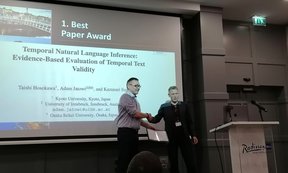The European Conference on Information Retrieval (ECIR) is the most important European research conference for the presentation of new results in the field of Information Retrieval (IR). Out of a total of 489 submissions, 175 papers were accepted this year, and Adam Jatowt, with his co-authors Taishi Hosokawa and Kazunari Sugiyama, received the conference's Best Paper Award for the paper "Temporal Natural Language Inference: Evidence-Based Evaluation of Temporal Text Validity".
"It is important to understand whether textual information remains valid or not - this applies to various applications, such as understanding stories, information retrieval, and tracking state and information status in microblogs and chatbot conversations. It is also beneficial to understand stories more deeply," explains the computer scientist. For computers, however, this kind of "understanding" is difficult because it requires temporal imagination. In the now awarded paper, the authors therefore propose a novel task, Temporal Natural Language Inference, which uses traditional natural language understanding to determine the temporal validity of textual content. "The task requires inferring and judging whether an action expressed in a sentence is still in progress or already completed, i.e., whether the sentence is still valid given its additional content. We first create our own dataset for this task and train different machine learning models," says Jatowt. The computer scientists then propose an effective method for learning information from an external knowledge base that provides evidence of temporal commonsense knowledge. Using a prepared dataset, the paper presents a new machine learning model that incorporates the information from the knowledge base and shows that the new model performs better on the proposed task than the other state-of-the-art approaches.

